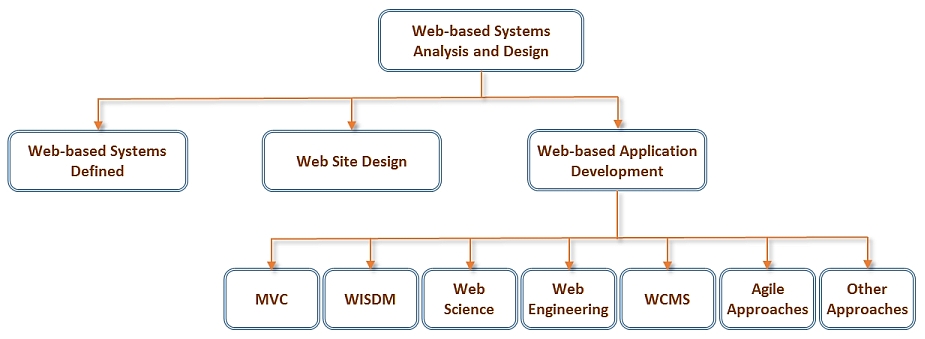Section 0: Section Objectives or Competencies
- The student will be able to explain the differences between web-based systems and conventional systems.
- The student will be able to explain the differences between the development of web-based systems and traditional systems.
- The student will be introduced to frameworks and design patterns, particularly MVC.
- The student will be able to explain the features of specialized web application design approaches, especially the Web Information Systems Development Methodology (WISDM).
- The student will be able to compare and contrast alternative approaches to web application design, including Web Science, Web Engineering, the use of Web Content Management Systems, and others.
Section 1: Concept Map

Section 2: Overview
In this section we discuss the development of web-based systems.
We begin by explaining what we mean by web-based systems, consider the importance of website design, and then explore a variety of web application development tools and techniques.
- In order to understand web-based systems we discuss what differentiates web-based systems from conventional systems by contemplating the characteristics of web software as well as the features of web projects.
- Web site design is introduced so that students become aware of the role that various factors such as a quality site design plan, site structure, and page design play in the success of a web-based system.
- The discussion of web application development begins with an examination of how web information system development is different from the analysis and design of conventional systems, followed by an overview of the web development methods that enable a developer to understand, characterize, and then build a high-quality web application. Tools and technologies, as well as best practices, are also discussed.
- The next topic, Frameworks and Design Patterns, exposes students to software design concepts that embody the expert techniques and program structures used by veteran programmers to facilitate the design of software. Students will learn the basics of the Model-View-Controller (MVC) design pattern and the role of frameworks (development environments) in developing web applications.
- Specific methodologies and disciplines have arisen to facilitate web software development, including the Web Information Systems Development Methodology, Web Science, and Web Engineering. Other approaches intended for conventional software development, like the Unified Process, Agile, and Content Management Systems, have also been adapted to web-based application development.





